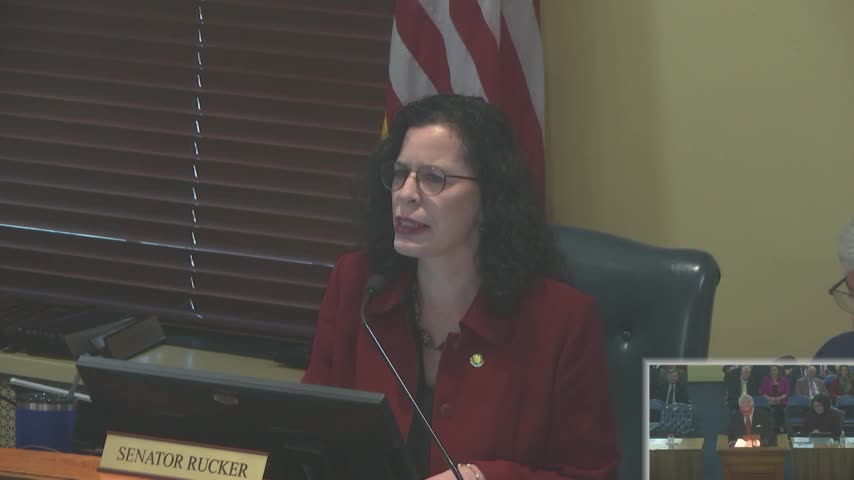Senate committee backs raise in insurance surcharge to fund volunteer fire recruitment, training and protection; county-distribution amendment fails
Get AI-powered insights, summaries, and transcripts
Subscribe
Summary
The Senate Government Organization Committee voted to report a committee substitute for Senate Bill 20 to the full Senate, approving an increase in the policy surcharge from 0.55% to 1% to boost funding for volunteer fire departments, while an amendment to reallocate part of the new revenue by county population failed on a tied vote.
CHARLESTON, W.Va. — The Senate Government Organization Committee voted to report a committee substitute for Senate Bill 20 to the full Senate with the recommendation that it pass, approving an increase in the policy surcharge on fire and casualty insurance from 0.55% to 1% and a corresponding raise in the surplus-lines surcharge from 4.55% to 5%.
The bill directs the additional revenue into three funds for volunteer fire department support: 64% to the Fire Protection Fund, 22% to the Fire Service Equipment and Training Fund, and 14% to a new Fire Service Recruitment and Retention Fund. Sponsors and fiscal documents estimate the surcharge change could raise an additional approximately $14,177,000 in the first year and make total distributions to volunteer fire departments about $31.5 million annually. The bill sets an effective date of Jan. 1, 2026, at the request of the Office of the Insurance Commissioner so changes align with calendar-year premium billing.
Committee counsel described how the bill inserts a new section (referred to in the bill as 15-11-11a) adjacent to existing code for the equipment and training fund and explained the intended split of the full 1% surcharge among the three funds. Erin Hunter, deputy insurance commissioner and general counsel, told the committee the increase would amount to a 0.45 percentage-point rise on premiums (0.45% of a policy premium), which the insurance office estimates translates to about 45 cents per $100 of premium collected on property and casualty lines, including private passenger auto.
State Fire Marshal Kenneth Tyree and Randy James, speaking on behalf of the Fire Chiefs Association and as a volunteer fire captain, described operational needs and why steady funding matters. Tyree said departments range across ISO ratings of 1 to 10 and noted water supply, distances to coverage and staffing all affect ISO and insurance rates; he cautioned that a department closure could raise local ISO ratings and therefore homeowners’ premiums in that area. James said many departments rely on the historic surcharge distributions as predictable revenue used to secure loans for stations and apparatus.
Committee members debated an amendment offered by the junior senator from the sixteenth proposing that the additional 0.45 percentage-point increase be redistributed so that the portion allocated to the Fire Protection Fund would be split to counties by population and then shared equally among volunteer fire departments within each county. Supporters said the change would better reflect call volume and county-level needs; opponents warned it could reduce predictable baseline allocations for small rural departments that rely on the current equal distribution.
Committee counsel warned that under the bill’s substantive reallocation the existing 0.55% would be folded into the three funds and therefore some of the money departments now receive could become grant-based rather than guaranteed. After division and recount, the amendment vote was recorded even (6–6) and the amendment failed. Committee members then approved the committee substitute and moved to report SB 20 to the full Senate with the recommendation that it pass and first be referred to the Finance Committee.
The bill’s fiscal notes and committee discussion noted that the Fire Protection Fund has existed since 1981 and currently is distributed to roughly 427 volunteer fire departments on an equal-share basis from the existing surcharge. The equipment and training fund was created in 2020 but has not had a steady funding source. Counsel and witnesses said equipment and training grants generally consider call volume, mission and other criteria; testimony estimated structural firefighting equipment and related initial outfitting per firefighter can range from about $8,000 to $14,000 and that replacement cycles for gear are often around 10 years.
The committee agreed the effective date should be Jan. 1, 2026, to accommodate premium cycles and the insurance commissioner’s administrative needs. With the committee’s recommendation, the committee substitute for SB 20 will go to the full Senate and be referred to the Finance Committee for further consideration.
Members noted remaining policy choices for finance and floor consideration, including whether to preserve the current guaranteed baseline distribution to all departments and how to target additional grant funds for recruitment, retention and equipment.
